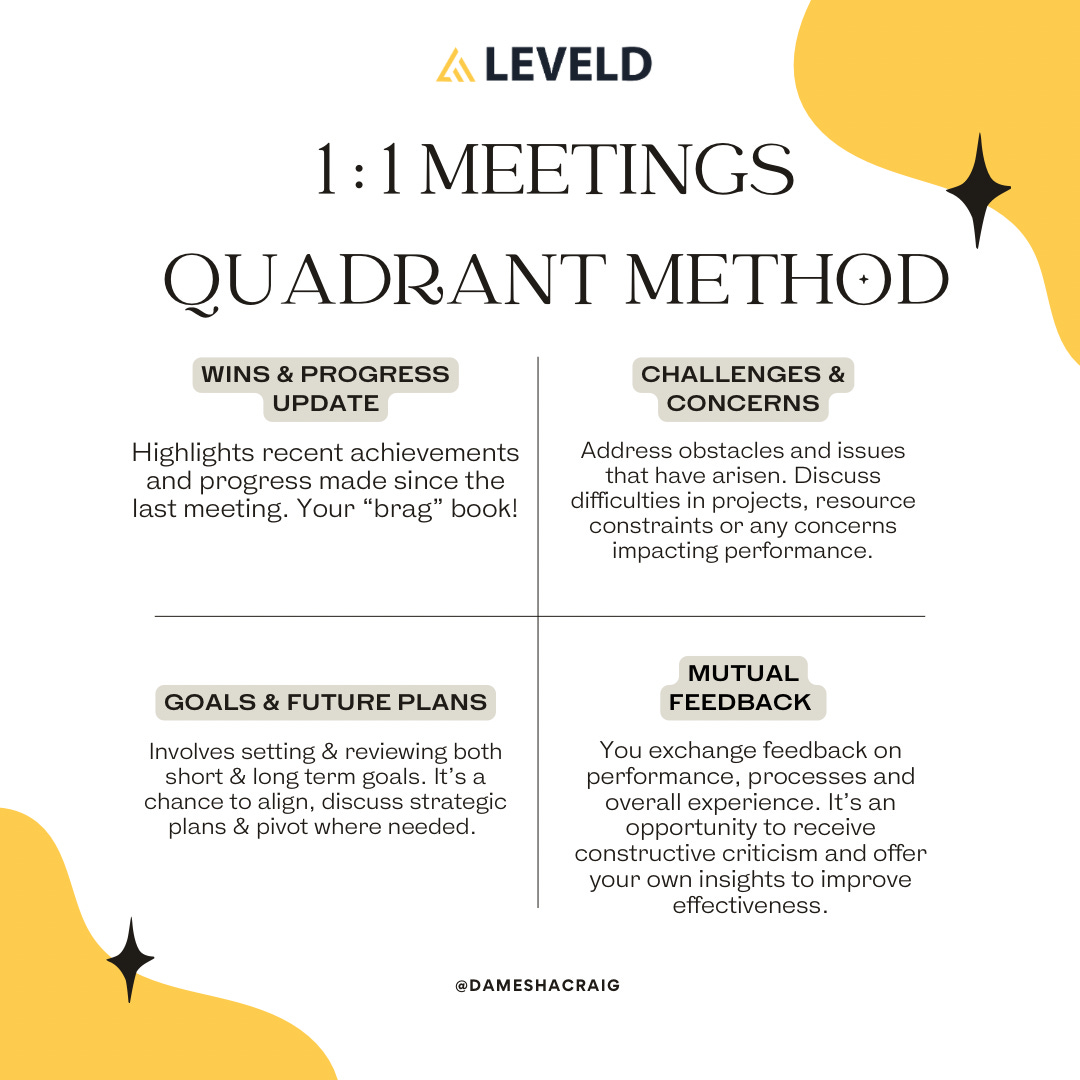1:1 Meetings Best Practices: Maximizing the Impact for Managers & Direct Reports
In the fast-paced world of startups, it's astonishing how many managers treat 1:1 meetings as casual hangout sessions rather than focused, strategic discussions. While building rapport and fostering a positive work environment are crucial, it’s essential to recognize that blending these social interactions with the formal objectives of 1:1 meetings can undermine their effectiveness.
These meetings should be dedicated to meaningful conversations about performance, goals, and professional development, ensuring they drive growth and productivity rather than simply serving as a relaxed chat or gossip session.
Taking the Lead: Preparing for 1:1 Meetings with Executives and Founders
When your 1:1 meeting involves an Executive or Founder, it's likely that they won't be handling the preparation for you. In these cases, it's crucial to take the initiative and prepare the agenda yourself. Start by outlining key topics, questions, and concerns that you want to address. To streamline this process, I use the quadrant method, which helps organize the discussion into four key areas: wins & progress updates, challenges and concerns, goals and future plans, and feedback. The last bucket is crucial this is an opportunity not just for you to receive their feedback, but also give your feedback. This approach ensures a comprehensive and structured meeting, making it easier for both you and the executive to focus on what's most important. This approach is equally beneficial for both managers and direct reports. It simplifies meetings, ensuring they remain productive and focused.
Manager and Direct Report 1:1 Meetings
1:1 meetings between managers and their team members are pivotal in fostering effective communication, driving professional growth, and enhancing overall team performance. These meetings offer a dedicated time for employees to engage directly with their managers, learn personal and professional goals, discuss progress, address challenges, and align on company goals.
To ensure these interactions are as productive and meaningful as possible, it's essential to adhere to best practices that maximize their impact.
Here’s a guide to making the most of these crucial meetings:
1. Set Clear Objectives
Before the meeting, both the manager and the employee should have a clear understanding of the objectives. This involves setting an agenda that outlines the topics to be discussed, such as project updates, feedback, and personal development. Clear objectives ensure that the meeting remains focused and productive.
Tip: Send the agenda and any relevant materials in advance to give both parties time to prepare. I love a running google doc, dated and broken down into clearly defined sections.
2. Create a Safe and Open Environment
1:1 meetings should be a space where employees feel comfortable sharing their thoughts and concerns. Building trust is key. Managers should approach these meetings with empathy, active listening, and an open mind. This fosters a supportive environment where employees feel valued and heard.
Tip: Start the meeting with open-ended questions to encourage dialogue and show genuine interest in the employee’s perspective.
3. Provide Constructive Feedback
Feedback is a critical component of professional development. Managers should offer constructive feedback that is specific, actionable, and delivered in a positive manner. This helps employees understand their strengths and areas for improvement while motivating them to grow.
Tip: Balance critical feedback with positive reinforcement to maintain morale and encourage continuous improvement.
4. Set Actionable Goals
1:1 meetings are an excellent opportunity to set and review goals. Managers and employees should collaborate to establish clear, achievable goals that align with both individual aspirations and organizational objectives. Regularly reviewing progress on these goals helps maintain focus and drive.
Tip: Use SMART criteria (Specific, Measurable, Achievable, Relevant, Time-bound) to set goals and track progress.
5. Address Challenges and Concerns
Employees often face challenges that may not be apparent in day-to-day interactions. The 1:1 meeting provides a chance to address these issues in a focused manner. Managers should actively solicit feedback on any obstacles the employee is facing and work together to find solutions.
Tip: Approach problem-solving collaboratively, offering support and resources to help overcome challenges.
6. Encourage Professional Development
1:1 meetings should also focus on the employee’s career growth and development. Discuss opportunities for skill enhancement, training, and career progression. Supporting professional development helps employees feel valued and motivated to advance within the organization.
Tip: Regularly revisit and update development plans based on the employee’s evolving goals and aspirations.
7. Follow Up and Follow Through
After the meeting, it’s crucial to follow up on action items and commitments made during the discussion. This demonstrates accountability and reinforces the importance of the conversation. Managers should ensure that any agreed-upon actions are implemented and that progress is reviewed in subsequent meetings.
Tip: Summarize key takeaways and action items in a follow-up email to ensure clarity and accountability.
8. Solicit Feedback on the Meeting Process
To continuously improve the effectiveness of 1:1 meetings, managers should solicit feedback from employees about the meeting process itself. Understanding what works well and what could be improved helps refine the approach and make the meetings more valuable.
Tip: Use a brief survey or informal conversation to gather feedback on the meeting’s format, frequency, and content.
Effective 1:1 meetings are more than just a routine check-in; they are a powerful tool for enhancing communication, supporting professional growth, and building stronger relationships within the team. By setting clear objectives, fostering a supportive environment, providing constructive feedback, setting actionable goals, addressing challenges, encouraging professional development, following up, and soliciting feedback, managers can ensure that these meetings contribute significantly to both individual and organizational success.
Responsibilities in 1:1 Meetings: Managers vs. Direct Reports
1:1 meetings are a cornerstone of effective communication and performance management, offering a vital opportunity to understand and develop both individual and team potential. These meetings should be more than just informal catch-ups; they are strategic interactions designed to evaluate strengths, address areas for improvement, build trust, and align on short- and long-term goals.
Here’s a deeper look at how these elements come into play:
Manager’s Responsibilities
Prepare for the Meeting
Review Performance and Progress: Assess the direct report’s recent work, achievements, and any issues before the meeting.
Set an Agenda: Create a structured agenda that outlines the topics to be discussed, including updates, feedback, and goal setting. This should be a mutual effort by the manager and the direct report.
Create a Supportive Environment
Foster Trust: Approach the meeting with empathy and openness to create a safe space for honest dialogue.
Encourage Openness: Actively listen and show genuine interest in the direct report’s perspectives and concerns.
Provide Constructive Feedback
Deliver Specific Feedback: Offer actionable, specific feedback on performance, highlighting both strengths and areas for improvement.
Balance Feedback: Provide a balanced view by acknowledging accomplishments along with areas needing attention.
Set and Review Goals
Collaborate on Goal Setting: Work with the direct report to set clear, achievable goals aligned with both individual aspirations and team objectives.
Track Progress: Review progress on previously set goals and adjust as needed based on performance and evolving priorities.
Address Challenges and Support Solutions
Discuss Obstacles: Identify and discuss any challenges the direct report is facing.
Offer Support: Provide resources, guidance, or adjustments to help overcome these challenges.
Support Professional Development
Identify Opportunities: Discuss opportunities for growth, training, and career advancement.
Provide Guidance: Offer mentorship and support to help the direct report achieve their professional development goals.
Follow Up on Action Items
Ensure Accountability: Follow up on agreed-upon actions and commitments from the meeting.
Review Outcomes: Assess the outcomes of action items in subsequent meetings to ensure progress and accountability.
Solicit Feedback on the Meeting Process
Seek Input: Ask the direct report for feedback on the meeting’s effectiveness and any areas for improvement.
Direct Report’s Responsibilities
Prepare for the Meeting
Review Work and Progress: Reflect on recent achievements, challenges, and any updates before the meeting. Have a your brag book ready - sometimes managers don’t see everything you are accomplishing.
Prepare Questions and Topics: Identify any issues or topics you want to discuss, and come prepared with questions or discussion points.
Engage in the Discussion
Communicate Honestly: Share your thoughts, concerns, and feedback openly and constructively.
Be Receptive: Listen actively to feedback and guidance provided by the manager.
Seek and Receive Feedback
Request Feedback: Actively seek feedback on your performance and areas for improvement.
Accept Constructive Criticism: Approach feedback with an open mind and a willingness to learn.
Set and Review Goals
Collaborate on Goals: Work with the manager to set realistic and achievable goals.
Review Progress: Provide updates on your progress towards previously set goals and discuss any adjustments needed.
Address Challenges and Seek Support
Discuss Obstacles: Share any challenges you are facing and seek guidance or resources to address them.
Request Support: Identify areas where you need additional support or resources and discuss them with your manager.
Pursue Professional Development
Identify Development Needs: Discuss your career aspirations and areas for skill enhancement with your manager.
Act on Development Opportunities: Take initiative in pursuing identified development opportunities and training.
Follow Up on Action Items
Complete Tasks: Act on any commitments or action items agreed upon during the meeting.
Update on Progress: Provide updates on the status of action items in subsequent meetings.
Provide Feedback on the Meeting Process
Share Input: Offer feedback on the meeting’s format, frequency, and content to help improve its effectiveness.
Both managers and direct reports play essential roles in making 1:1 meetings successful. Managers are responsible for preparing, guiding, and supporting their direct reports, while direct reports are responsible for engaging, communicating, and following through on agreed actions. By fulfilling these responsibilities, both parties can ensure that 1:1 meetings are a valuable tool for professional growth, effective communication, and enhanced team performance.
Thought-Provoking Questions
Here are two thought-provoking questions designed to enhance the effectiveness of 1:1 meetings by fostering deeper understanding and alignment between managers and direct reports. These questions aim to address support needs, align efforts with broader goals, and ensure that both parties are focused on achieving mutual success.
For Managers:
What specific support or resources do you need from me to achieve your current goals and overcome any challenges you're facing?
This question encourages direct reports to articulate their needs clearly, allowing managers to provide targeted support and remove obstacles to their success.
For Direct Reports:
How can I better align my efforts and objectives with the broader goals of the team or organization to ensure we're moving in the same direction?
This question helps direct reports understand how their work contributes to the larger vision, and it opens up a dialogue about aligning personal goals with team and organizational objectives.
QOTD
"Communication is the key to effective leadership and building strong, successful teams." — John C. Maxwell
Feedback from Soul Fuelers
Thank you once again to everyone who provided invaluable feedback to enhance The Soul Fueler Journal. I’ve already incorporated several of your suggestions and am excited to announce one more change: the frequency.
Going forward, The Soul Fueler Journal will be published Monday through Thursday. This adjustment will give you Fridays to catch up on any entries you might have missed throughout the week. Please keep the feedback coming and thank you again for subscribing to The Soul Fueler Journal! Appreciate you!




